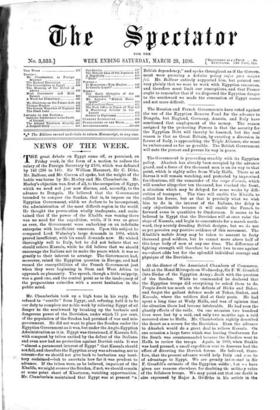Mr. Chamberlain took up a high tone in his reply.
He refused to "scuttle" from Egypt, and, refusing, held it to be our duty to complete our noble work by relieving Egypt of all danger to the southward by breaking up the barbaric and dangerous power of the Dervishes, under which 75 per cent. of the population of the Soudan had perished of war and mis- government. He did not want to place the Soudan under the Egyptian Government as it was, but under the Anglo-Egyptian Administration as it is. Egypt was threatened, if Kassala fell, with conquest by tribes excited by the defeat of the Italians' and even now had no protection against Dervish raids. It was "almost a paramount interest of Egypt" that Kassala should nbt fall, and therefore the Egyptian army was advancing, not to retreitV--fer we should not give back to barbarism any terri- tory reclaimed—but to ascertain how far it was prudent to advance. If The tribes were, as be believed, impatient of the Khalifa, we might recover the Soudan, if not, we should remain at some point short of Khartoum, watching opportunities. Mr. Chamberlain maintained that Egypt was at present "a British dependency," and spoke throughout as if the Govern. ment were pursuing a definite policy cujus pars magna fui. Mr. Balfour entirely supported him, but pointed out very plainly that we were to work with Egyptian resources, and therefore must limit our conceptions, and that France ought to remember that if we dispersed the Egyptian danger to the southward we made the evacuation of Egypt easier and not more difficult.






































